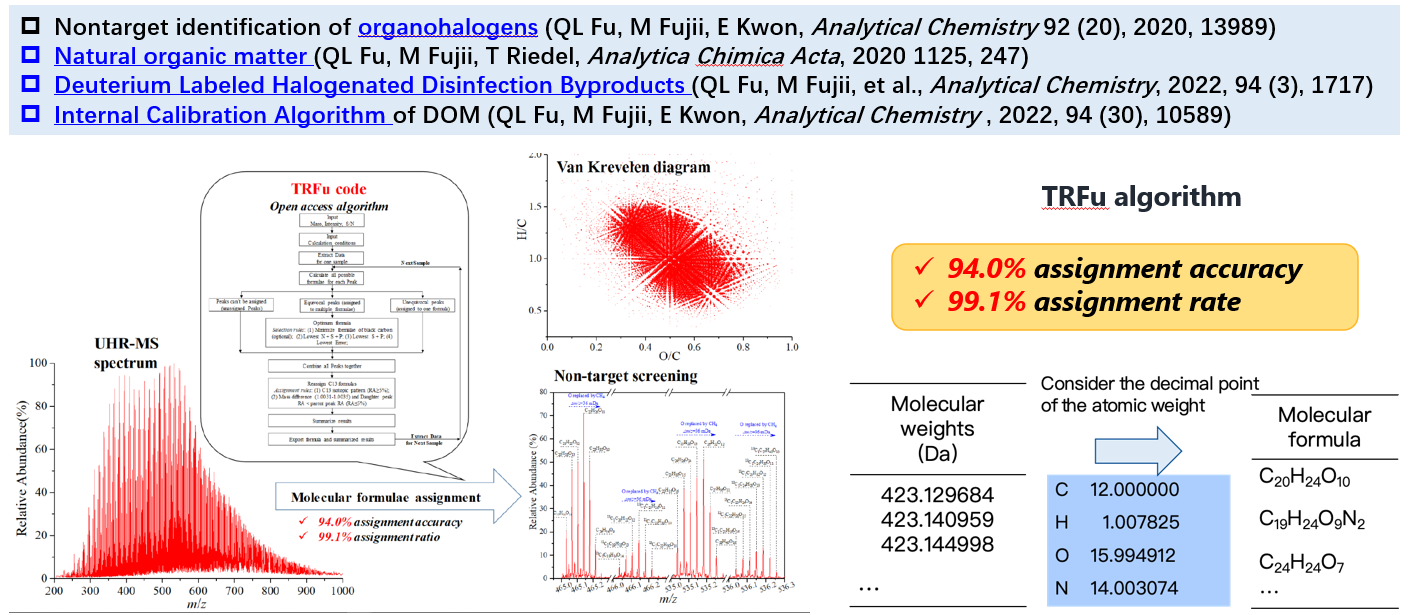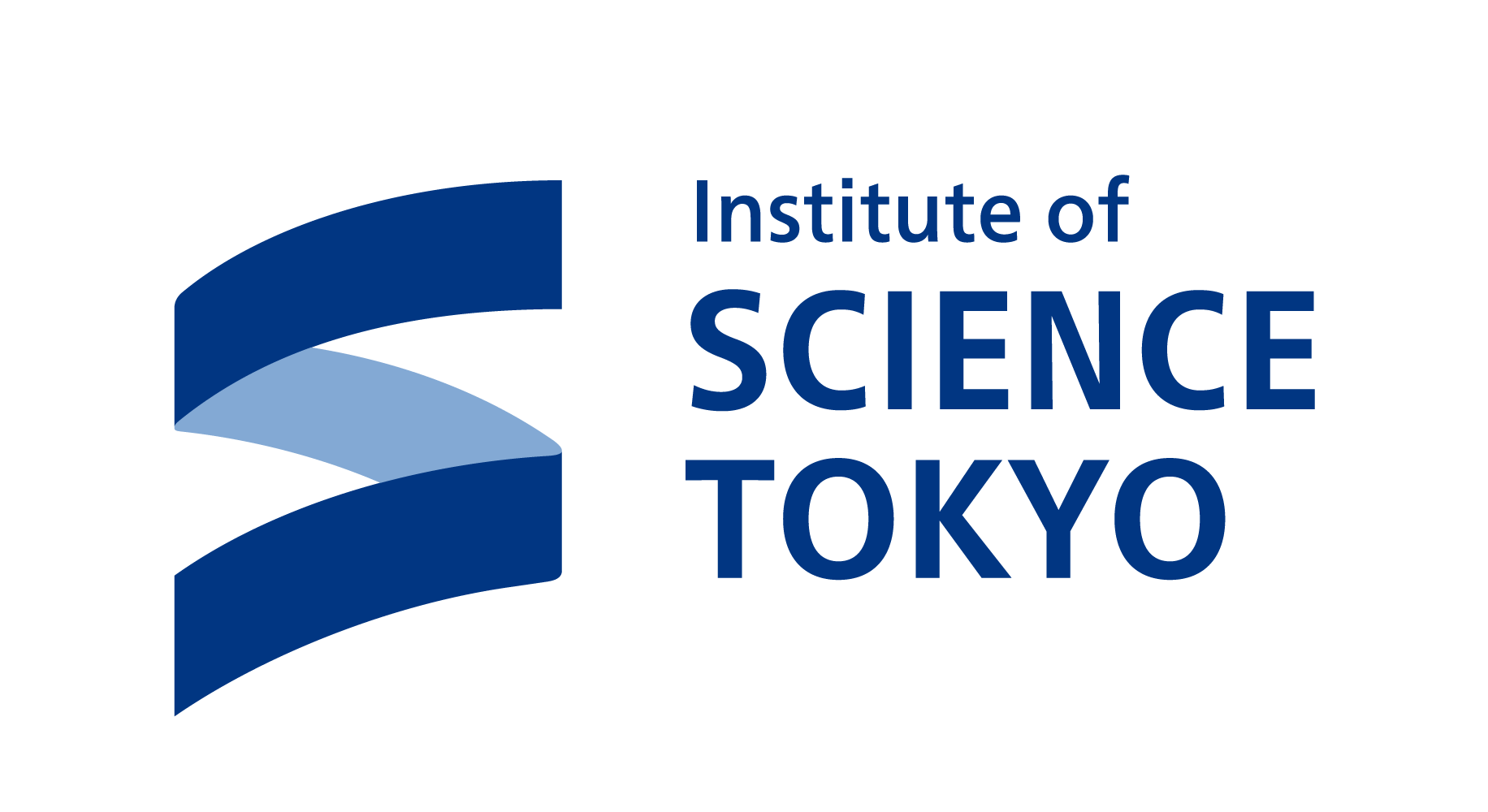
1分子レベルで多様な有機物・化学物質を網羅的に検出する技術の開発 / Development of technology for comprehensive detection of various organic matters and chemicals at the single-molecule level
河川や沿岸域などの自然水中には多様な有機物が存在します。例えば、森林土壌を由来とする腐植物質や蛋白質、多糖、核酸等の自然有機物の加え、医薬品や農薬、界面活性剤、食品添加物などの様々な人工汚染物質も含まれます。従来から河川や湖沼、下水処理水等の水質(汚染)評価には、ある特定の有害有機物や機能群を対象とした分析が行われてきました。しかし、自然水中や処理水中には、潜在的に有害なものも含め数千から数万の有機分子が存在することを鑑みると、このような特定の物質を対象とした従来のターゲット分析では、多くの他の重要な有害物質等を見過ごしている可能性があります。本研究テーマでは、超高精度質量分析(FT-ICR-MS)ならびに化合物同定アルゴリズム等の解析技術を駆使することで、多様な有機物を1分子レベルで網羅的分析可能な新たな水質評価法(いわゆる非ターゲット分析)の開発を目的としています(図)。超高精度質量分析では、1 ppmレベルで有機分子質量を測定し、各原子の質量情報をもとに分子組成を推定します。従来から海洋学分野で公表されていた分子組成決定アルゴリズムを基礎とし、陸域由来有機分子組成で想定される元素比に関する制約や安定同位体情報、さらには有機分子の反応に関わる条件等を考慮した発展的なアルゴリズムを開発しています。以上のような新たな水質評価手法の開発により、どういった有機物質が流域のどこから、どれだけ来ているのかといった情報が明らかになりつつあります。水生生態系を含む環境と水利用のバランスを保ち、持続可能な社会を実現するには、水中に含まれるあらゆる物質をより正確に検出する技術が必要であり、ここに本研究の意義があると考えています。
A wide variety of dissolved organic matters (DOM) exists in natural water, such as rivers and coastal areas. For example, in addition to natural organic matters (NOM) such as humic substances, proteins, polysaccharides, and nucleic acids derived from forest soils and so forth, there are also various anthropogenic pollutants such as pharmaceuticals, pesticides, surfactants, and food additives. Traditionally, water quality (pollution) assessments of rivers, lakes, and treated sewage water have been conducted for certain toxic organic matters and functional groups (i.e., target analysis). However, such conventional target analysis may overlook many of other important hazardous substances, given that there are thousands to tens of thousands of organic molecules in natural and treated water, including potentially harmful ones. This theme aims to develop a new water quality assessment method (non-targeted analysis) that can comprehensively analyzes a variety of organic matters at the single-molecule level by utilizing analytical technologies such as ultra-high precision mass spectrometry (FT-ICR-MS) and compound identification algorithms (see figure). Ultra-high precision mass spectrometry can determine the mass of organic molecules at the 1 ppm level, and estimates the molecular composition based on the mass information of each atom. Based on the algorithm for determining molecular composition that has been published in the field of oceanography, we are developing an advanced algorithm that takes into account restrictions on elemental ratios, stable isotope information, and conditions related to the reaction of terrestrially derived organic matters. The development of these new water quality assessment methods could clarify the questions; e.g., what kind of organic matters present in aquatic system is coming from where ? and how?. In order to maintain a balance between the environment, including aquatic ecosystems, and water use, and to realize a sustainable society, we need a more accurate detection technology for all substances in water, and this is the significance of this research.
TRFuアルゴリズムによりFTMS質量データから数千の有機物分子組成を解明する / TRFu algorithm reveals thousands of organic molecular compositions from FTMS mass data (figure from Fu et al, 2020)

関連文献 / Reference
QL Fu, M Fujii, E Kwon, Development of an internal calibration algorithm for ultrahigh-resolution mass spectra of dissolved organic matter, Analytical Chemistry 94 (30), 10589-10594, 2022
QL Fu, M Fujii, R Ma, Development of a Gaussian-based alignment algorithm for the ultrahigh-resolution mass spectra of dissolved organic matter, Analytical Chemistry 95 (5), 2796-2803, 2023
科研費挑戦的研究(萌芽) 2019-20年度「量子化学計算による高度処理での有機微量汚染物質の反応経路解析」(研究代表)、等

